一般将来时态
一般将来时态
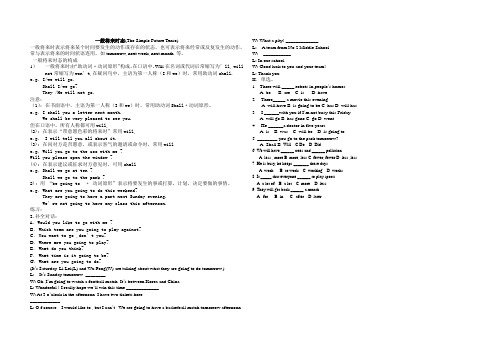
一般将来时态(The Simple Future Tense)一般将来时表示将来某个时间要发生的动作或存在的状态,也可表示将来经常或反复发生的动作,常与表示将来的时间状语连用,如tomorrow, next week, next month 等。
一般将来时态的构成1)一般将来时由“助动词﹢动词原形”构成。
在口语中,Will在名词或代词后常缩写为’ll, will not常缩写为won’t,在疑问句中,主语为第一人称(I和we)时,常用助动词shall.e.g. I/we will go.Shall I/we go?They /He will not go.注意:(1):在书面语中,主语为第一人称(I和we)时,常用助动词Shall﹢动词原形。
e.g.I shall you a letter next month.We shall be very pleased to see you.但在口语中,所有人称都可用will,(2): 在表示“带意愿色彩的将来时”常用will,e.g. I will tell you all about it.(3): 在问对方是否愿意,或表示客气的邀请或命令时,常用wille.g. Will you go to the zoo with me ?Will you please open the window ?(4): 在表示建议或征求对方意见时,可用shalle.g. Shall we go at ten ?Shall we go to the park ?2): 用“be going to ﹢动词原形”表示将要发生的事或打算,计划,决定要做的事情。
e.g.What are you going to do this weekend?They are going to have a part next Sunday evening.We’re not going to have any class this afternoon.练习:I.补全对话:A.Would you like to go with me ?B.W hich team are you going to play against?C.Y ou want to go ,don’t you?D.Where are you going to play?E.What do you think?F.What time is it going to be?G.What are you going to do?(It’s Saturday. Li Lei(L) and Wu Peng(W) are talking about what they are going to do tomorrow.)L: It’s Sunday tomorrow .________W: Oh ,I’m going to watch a football match. It’s between Korea and China.L: Wonderful ! I really hope we’ll win this time._____________W: At 3 o’clock in the afternoon. I have two tickets here.____________L: O f course I would like to , but I can’t . We are going to have a basketball match tomorrow afternoon. W: What a pity! _____________L: A team from No.2 Middle School.W: ___________L: In our school.W: Good luck to you and your team!L: Thank you.II.单选。
一般将来时态
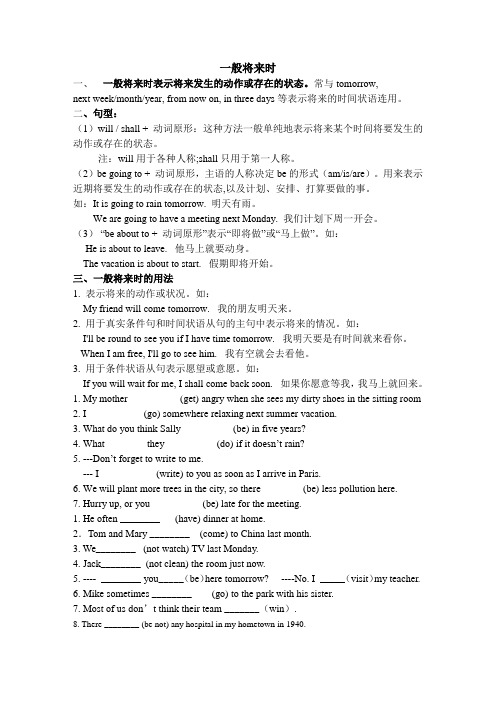
一般将来时一、一般将来时表示将来发生的动作或存在的状态。
常与tomorrow,next week/month/year, from now on, in three days等表示将来的时间状语连用。
二、句型:(1)will / shall + 动词原形:这种方法一般单纯地表示将来某个时间将要发生的动作或存在的状态。
注:will用于各种人称;shall只用于第一人称。
(2)be going to + 动词原形,主语的人称决定be的形式(am/is/are)。
用来表示近期将要发生的动作或存在的状态,以及计划、安排、打算要做的事。
如:It is going to rain tomorrow. 明天有雨。
We are going to have a meeting next Monday. 我们计划下周一开会。
(3)“be about to + 动词原形”表示“即将做”或“马上做”。
如:He is about to leave. 他马上就要动身。
The vacation is about to start. 假期即将开始。
三、一般将来时的用法1. 表示将来的动作或状况。
如:My friend will come tomorrow. 我的朋友明天来。
2. 用于真实条件句和时间状语从句的主句中表示将来的情况。
如:I'll be round to see you if I have time tomorrow. 我明天要是有时间就来看你。
When I am free, I'll go to see him. 我有空就会去看他。
3. 用于条件状语从句表示愿望或意愿。
如:If you will wait for me, I shall come back soon. 如果你愿意等我,我马上就回来。
1. My mother __________(get) angry when she sees my dirty shoes in the sitting room2. I ___________(go) somewhere relaxing next summer vacation.3. What do you think Sally __________(be) in five years?4. What ________they __________(do) if it doesn’t rain?5. ---Don’t forget to write to me.--- I ___________(write) to you as soon as I arrive in Paris.6. We will plant more trees in the city, so there ________(be) less pollution here.7. Hurry up, or you __________(be) late for the meeting.1. He often ________ (have) dinner at home.2.Tom and Mary ________ (come) to China last month.3. We________ (not watch) TV last Monday.4. Jack________ (not clean) the room just now.5. ---- ________ you_____(be)here tomorrow? ----No. I _____(visit)my teacher.6. Mike sometimes ________ (go) to the park with his sister.7. Most of us don’t think their team _______(win).8. There ________ (be not) any hospital in my hometown in 1940.。
时态一般将来时
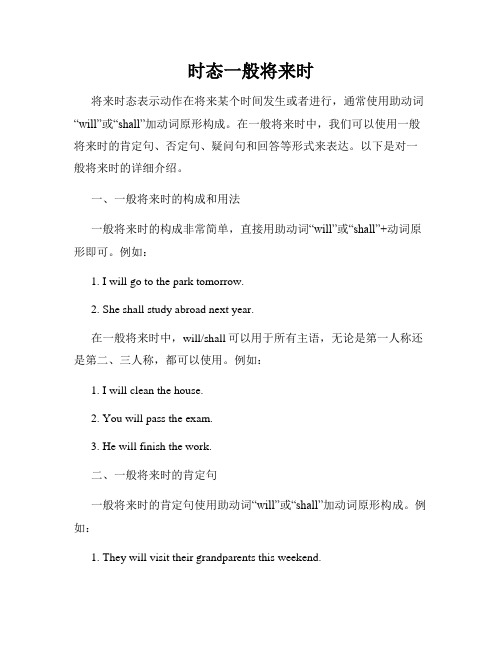
时态一般将来时将来时态表示动作在将来某个时间发生或者进行,通常使用助动词“will”或“shall”加动词原形构成。
在一般将来时中,我们可以使用一般将来时的肯定句、否定句、疑问句和回答等形式来表达。
以下是对一般将来时的详细介绍。
一、一般将来时的构成和用法一般将来时的构成非常简单,直接用助动词“will”或“shall”+动词原形即可。
例如:1. I will go to the park tomorrow.2. She shall study abroad next year.在一般将来时中,will/shall可以用于所有主语,无论是第一人称还是第二、三人称,都可以使用。
例如:1. I will clean the house.2. You will pass the exam.3. He will finish the work.二、一般将来时的肯定句一般将来时的肯定句使用助动词“will”或“shall”加动词原形构成。
例如:1. They will visit their grandparents this weekend.2. We shall have a party to celebrate.三、一般将来时的否定句一般将来时的否定句在助动词“will”或“shall”后面加上“not”,形成“will not”或“shall not”。
例如:1. She will not go to the concert.2. We shall not be late for the meeting.四、一般将来时的疑问句一般将来时的疑问句是将助动词“will”或“shall”提到主语之前。
例如:1. Will you join us for dinner?2. Shall we go to the cinema together?五、一般将来时的答案在一般将来时的疑问句中,肯定回答用"Yes, 主语 + will/shall"的形式,否定回答用"No, 主语 + will/shall not"的形式。
一般将来时态

PART 05
练习与巩固
REPORTING
基础练习题
用will表示基本的将 来时态
用be to表示计划好 的将来时态
总结词:熟悉一般 将来时态的基本用 法
用be going to表示 基于主观判断的将 来时态
用be about to表示 即将发生的将来时 态
进阶练习题
01
总结词:辨析一般将来时态与其 他时态的差异
PART 04
一般将来时态的特殊用法
REPORTING
表示将来经常发生的事情
经常性动作
使用助动词“will”或“shall”来表示一个 动作在将来经常发生,例如:“I will go to the market every Saturday.”
习惯性动作
使用助动词“will”或“shall”来表示一个 习惯性动作在将来重复发生,例如: “They shall arrive every Friday at 5 p.m.”
02
一般现在时态与一般将来时态的 对比
现在进行时态与一般将来时态的 对比
03
现在完成时态与一般将来时态的 对比
04
综合练习题
01
总结词:综合运用态 、现在完成时态与一般将来时 态的转换
疑问句的构成规则
规则一
Will + 主语 + 动词原形 + 其他?例如: Will she come to the party?(她会来 参加聚会吗?)
VS
规则二
主语 + Will + 动词原形 + 其他?例如: Will you help me with this task?(你 会帮我完成这项任务吗?)
表示将来的计划和安排
一般将来时态

this evening
What is the mouse going to do this evening? It is going to do its homework.
will
What is she going to do? She’s going to shop/ go shopping...
They are going to dance.
will
What are they going to do this evening? They are going to watch TV.
will
句式的变化规则:
1.变否定句—---在be/will后加not 。 2.变一般疑问句------将be/will动词提前。 (主语是第一人称I 时,变一般疑问句 时将I 变you) 3.特殊疑问句(也就是对划线部分提问) -----要用特殊疑问词what +一般疑问句。
表示“不肯”、“不能”等: e.g. We asked her to be the director but she won’t agree. Oil and water won’t mix. The car won’t start.
可表示未来情况的还有:
be going to 结构 现在进行时 一般现在时 be about to 结构 be + 不定式结构
系动词am,is,are的原形都是 。 例如: 系动词 , , 的原形都是be。 例如: 的原形都是 People will have robots in their home. 人们的家中将会有机器人。 人们的家中将会有机器人。 There will be one country in the world. 世界上将会只有一个国家。 世界上将会只有一个国家。 shall适用于第一人称 ,We;而will适用于所有人称。 适用于第一人称I, ; 适用于所有人称。 适用于第一人称 适用于所有人称 通常可以用will来代替 来代替shall。 通常可以用 来代替 。 will,shall均可缩写为:'ll,如: 均可缩写为: , , 均可缩写为 I will= I'll; ; she will = she’ll;will not 和shall not分别可以 ; 分别可以 缩写为 won't 和shan't。 。
一般将来时态
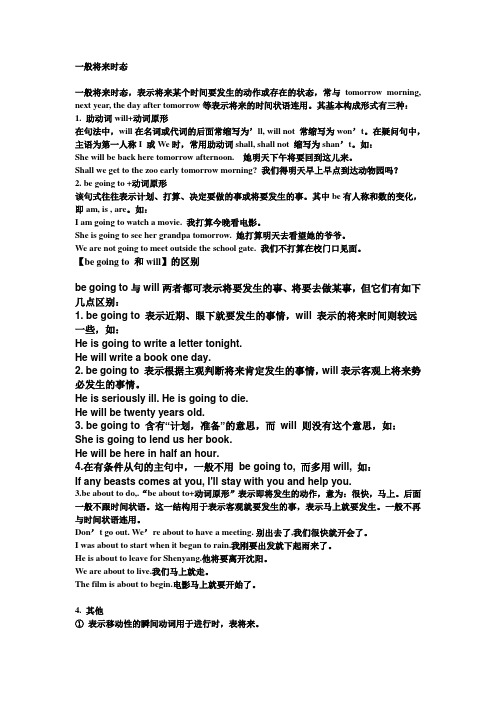
一般将来时态一般将来时态,表示将来某个时间要发生的动作或存在的状态,常与tomorrow morning, next year, the day after tomorrow等表示将来的时间状语连用。
其基本构成形式有三种:1. 助动词will+动词原形在句法中,will在名词或代词的后面常缩写为’ll, will not 常缩写为won’t。
在疑问句中,主语为第一人称I 或We时,常用助动词shall, shall not 缩写为shan’t。
如:She will be back here tomorrow afternoon. 她明天下午将要回到这儿来。
Shall we get to the zoo early tomorrow morning? 我们得明天早上早点到达动物园吗?2. be going to +动词原形该句式往往表示计划、打算、决定要做的事或将要发生的事。
其中be有人称和数的变化,即am, is , are。
如:I am going to watch a movie. 我打算今晚看电影。
She is going to see her grandpa tomorrow. 她打算明天去看望她的爷爷。
We are not going to meet outside the school gate. 我们不打算在校门口见面。
【be going to 和will】的区别be going to与will两者都可表示将要发生的事、将要去做某事,但它们有如下几点区别:1. be going to 表示近期、眼下就要发生的事情,will 表示的将来时间则较远一些,如:He is going to write a letter tonight.He will write a book one day.2. be going to 表示根据主观判断将来肯定发生的事情,will表示客观上将来势必发生的事情。
一般将来时态
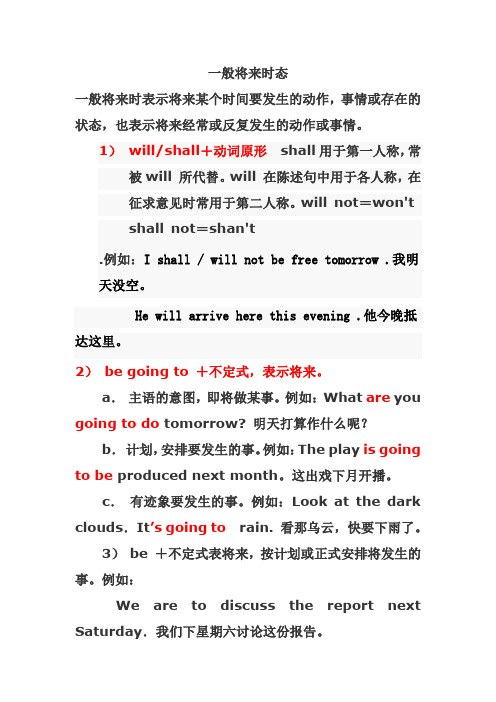
一般将来时态一般将来时表示将来某个时间要发生的动作,事情或存在的状态,也表示将来经常或反复发生的动作或事情。
1)will/shall+动词原形shall用于第一人称,常被will 所代替。
will 在陈述句中用于各人称,在征求意见时常用于第二人称。
will not=won'tshall not=shan't.例如:I shall / will not be free tomorrow .我明天没空。
He will arrive here this evening .他今晚抵达这里。
2)be going to +不定式,表示将来。
a.主语的意图,即将做某事。
例如:What are you going to do tomorrow? 明天打算作什么呢?b.计划,安排要发生的事。
例如:The play is going to be produced next month。
这出戏下月开播。
c.有迹象要发生的事。
例如:Look at the dark clouds.It’s going to rain. 看那乌云,快要下雨了。
3)be +不定式表将来,按计划或正式安排将发生的事。
例如:We are to discuss the report next Saturday.我们下星期六讨论这份报告。
4)be about to +不定式,意为马上做某事。
例如:He is about to leave for Beijing.他马上要去北京。
注意:be about to do 不能与tomorrow,next week 等表示明确将来时的时间状语连用。
Notice:be to和be going tobe to 表示客观安排或受人指示而做某事,be going to 表示主观的打算或计划。
例如:I am to play football tomorrow afternoon.明天下午我去踢球。
(客观安排)I'm going to play football tomorrow afternoon.明天下午我想去踢球。
一般将来时态

表示按计划、安排即将发生的动作。
例: 你假期打算做什么?
What are you doing for vacation? 我打算去野营。
I’m going camping.
(2) be will move to Shanghai tomorrow. I won’t move to Shanghai tomorrow. Will you move to Shanghai tomorrow? Yes, I will. / No, I won’t. Where will you move to tomorrow?
变否定句、一般疑问句及简略回答,再对划线部分提问。
1. I am going skateboarding tomorrow. I am not going skateboarding tomorrow. Are you going skateboarding tomorrow? Yes, I am. / No, I’m not. What are you doing tomorrow?
1.用法:①表示将来某个时间将要发生的动作或存 在的状态。常与表示将来的时间状语连用。
例:我下周会来看望你。I will visit you next week.
在一百年以后人们会使用钱吗?
Will people use money in 100 years?
明天学校有一场音乐会。(there be)
will适用于各种人称,可以跟人称代词缩写: I will= I’ll she will= she’ll he will= he’ll
一般将来时
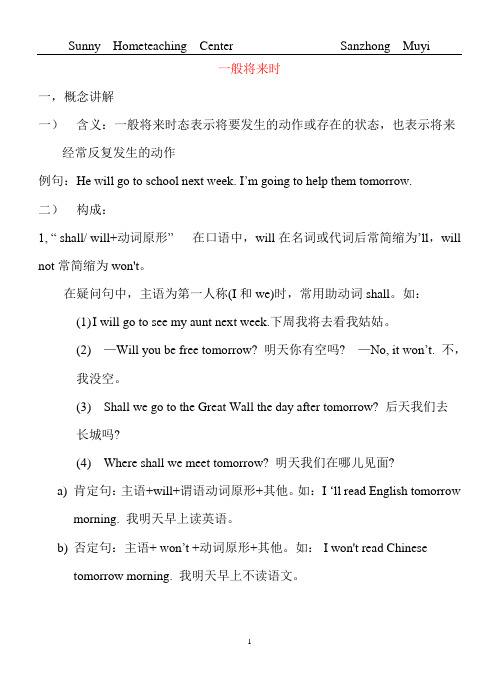
一般将来时一,概念讲解一)含义:一般将来时态表示将要发生的动作或存在的状态,也表示将来经常反复发生的动作例句:He will go to school next week. I‟m going to help them tomorrow.二)构成:1, “ shall/ will+动词原形” 在口语中,will在名词或代词后常简缩为‟ll,will not常简缩为won't。
在疑问句中,主语为第一人称(I和we)时,常用助动词shall。
如:(1)I will go to see my aunt next week.下周我将去看我姑姑。
(2) —Will you be free tomorrow? 明天你有空吗? —No, it won‟t. 不,我没空。
(3) Shall we go to the Great Wall the day after tomorrow? 后天我们去长城吗?(4) Where shall we meet tomorrow? 明天我们在哪儿见面?a)肯定句:主语+will+谓语动词原形+其他。
如:I …ll read English tomorrowmorning. 我明天早上读英语。
b)否定句:主语+ won‟t +动词原形+其他。
如: I won't read Chinesetomorrow morning. 我明天早上不读语文。
c)一般疑问句:助动词will+ 主语+ 动词原形+ 其他+? 如: will you readEnglish tomorrow morning ? Yes, I will./No, I won‟t . 你明天早上读英语吗?是的,我明天早上读英语。
/不是的,我明天早上不读英语。
d)特殊疑问句:特殊疑问词+一般疑问句+? 如:What will you dotomorrow morning ? 你明天早上做什么?2, “be going to + 动词原形”be going to常用来表示打算、计划、决定要做的事情或根据某些现象或征兆预测即将发生的事。
英语时态:一般将来时

英语时态:一般将来时一般将来时(simple future tense)表示将来某一时段的动作或状态,或将来某一段时间内经常的动作或状态。
一般将来时常常和表示将来的时间状语连用。
如:tomorrow, next week, in the future, in a year等。
Ⅰ. 句法结构【仅讨论陈述句和疑问句两种语式】:1.陈述句:A. 肯定形式:主语+be going to /will/shall +动词原形+其他B. 否定形式:主语+be not going to /will not/shall not+动词原形+其他注:a. 在直接在助动词后加not。
b. be going to结构中的be仅指am, is, are三个be动词。
c. will/shall+动原结构在谓语两态变化中无人称和数的变化。
d. 一般情况下,仅表示时态时,shall用于第一人称,will用于第二、三人称;表示说话人强烈意愿和语气时则用法相反。
2.疑问句:A. 一般疑问句:助动词提前即可①Be动词+主语+ going to +动词原形+其他②Will/Shall+主语+动词原形+其他B.特殊疑问句:特殊疑问词+一般疑问句(同上)3.被动语态:主语+ 助动词(结构) + be +动词过去分词【被动结构be done,时体现在助动词】➢两态变化例句参考下表(以will为例):Ⅰ. 主要用法及结构:1.【一般将来时表将来】一般将来时表示将要发生的动作或情况。
A.will/shall +动原I will(shall) arrive tomorrow.Will you be free tonight?B.be going to+动原a.表示计划、打算、准备做的事。
We are going to put up a building here.b.表示即将发生或肯定要发生的事。
I think it is going to snow.注:在一般将来时的句子中,有时有表示将来时间的状语,有时没有时间状语,这时要从意思上判断是否指未来的动作或情况。
一般将来时态的结构和用法
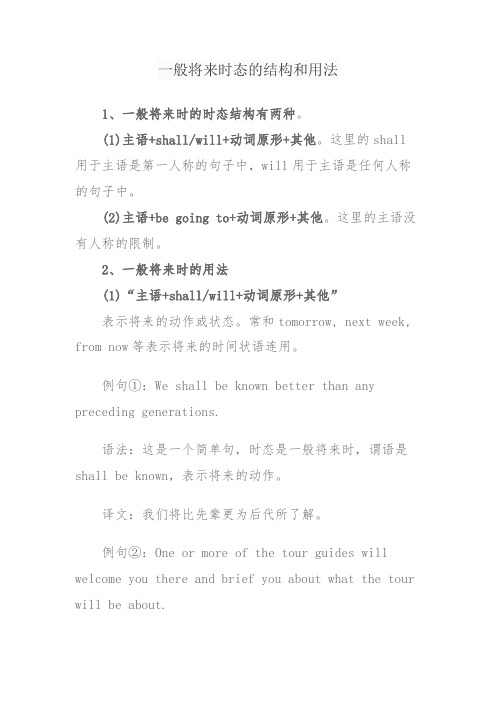
一般将来时态的结构和用法1、一般将来时的时态结构有两种。
(1)主语+shall/will+动词原形+其他。
这里的shall 用于主语是第一人称的句子中,will用于主语是任何人称的句子中。
(2)主语+be going to+动词原形+其他。
这里的主语没有人称的限制。
2、一般将来时的用法(1)“主语+shall/will+动词原形+其他”表示将来的动作或状态。
常和tomorrow, next week, from now等表示将来的时间状语连用。
例句①:We shall be known better than any preceding generations.语法:这是一个简单句,时态是一般将来时,谓语是shall be known,表示将来的动作。
译文:我们将比先辈更为后代所了解。
例句②:One or more of the tour guides will welcome you there and brief you about what the tour will be about.语法:这是一个主从复合句。
what引导的是宾语从句;主句和从句的时态都是一般将来时,谓语分别是will welcome…and brief和will be,表示将来的动作。
译文:有一个或几个导游会到那里迎接你们,并且向你们简要介绍参观的内容。
(2)“be going to+动词原形+其他”表示事先考虑过的将要发生的动作以及已有迹象表明必将要发生的某事,意为“打算,就要”。
例句:Now we go to Jane who is going to tell us about what's happening in town this weekend.语法:这是一个多重主从复合句。
who引导的是定语从句,该从句的时态是一般将来时,谓语是is going to tell;该定语从句中又包含一个由what引导的宾语从句,作介词about的宾语。
一般将来时定义,结构,标志词,用法,变化规则
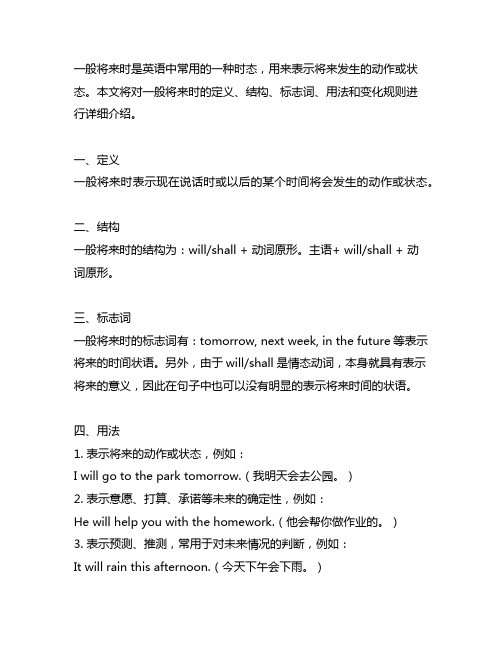
一般将来时是英语中常用的一种时态,用来表示将来发生的动作或状态。
本文将对一般将来时的定义、结构、标志词、用法和变化规则进行详细介绍。
一、定义一般将来时表示现在说话时或以后的某个时间将会发生的动作或状态。
二、结构一般将来时的结构为:will/shall + 动词原形。
主语+ will/shall + 动词原形。
三、标志词一般将来时的标志词有:tomorrow, next week, in the future等表示将来的时间状语。
另外,由于will/shall是情态动词,本身就具有表示将来的意义,因此在句子中也可以没有明显的表示将来时间的状语。
四、用法1. 表示将来的动作或状态,例如:I will go to the park tomorrow.(我明天会去公园。
)2. 表示意愿、打算、承诺等未来的确定性,例如:He will help you with the homework.(他会帮你做作业的。
)3. 表示预测、推测,常用于对未来情况的判断,例如:It will rain this afternoon.(今天下午会下雨。
)五、变化规则1. 肯定句的一般将来时结构为:will/shall + 动词原形。
例如:She wille to see me tomorrow.(她明天会来看我。
)2. 否定句的一般将来时结构为:will/shall + not + 动词原形。
例如:I will not go to the party tonight.(我今晚不会去参加派对。
)3. 疑问句的一般将来时结构为:will/shall + 主语+ 动词原形。
例如:Will youe to the meeting tomorrow?(你明天会来参加会议吗?)以上就是关于一般将来时的定义、结构、标志词、用法和变化规则的详细介绍。
希望对您有所帮助。
一般将来时是英语中最常用的一种时态之一,用于表示将来会发生的动作或状态。
一般将来时的6种表达方式
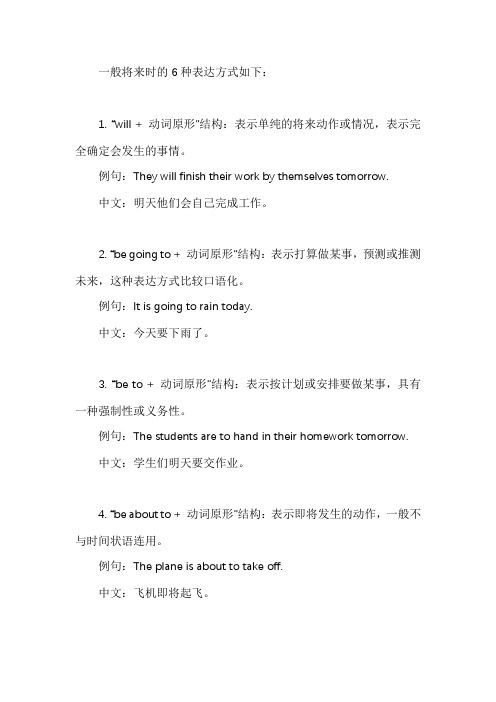
一般将来时的6种表达方式如下:
1. “will + 动词原形”结构:表示单纯的将来动作或情况,表示完全确定会发生的事情。
例句:They will finish their work by themselves tomorrow.
中文:明天他们会自己完成工作。
2. “be going to + 动词原形”结构:表示打算做某事,预测或推测未来,这种表达方式比较口语化。
例句:It is going to rain today.
中文:今天要下雨了。
3. “be to + 动词原形”结构:表示按计划或安排要做某事,具有一种强制性或义务性。
例句:The students are to hand in their homework tomorrow.
中文:学生们明天要交作业。
4. “be about to + 动词原形”结构:表示即将发生的动作,一般不与时间状语连用。
例句:The plane is about to take off.
中文:飞机即将起飞。
5. “be able to + 动词原形”结构:表示具有做某事的能力或可能性,通常用于现在时态。
例句:She is able to speak English fluently now.
中文:现在她能够流利地说英语了。
6. “be apt to + 动词原形”结构:表示具有某种倾向或易于发生某事,强调预测性。
例句:He is apt to forget his keys.
中文:他容易忘记带钥匙。
- 1、下载文档前请自行甄别文档内容的完整性,平台不提供额外的编辑、内容补充、找答案等附加服务。
- 2、"仅部分预览"的文档,不可在线预览部分如存在完整性等问题,可反馈申请退款(可完整预览的文档不适用该条件!)。
- 3、如文档侵犯您的权益,请联系客服反馈,我们会尽快为您处理(人工客服工作时间:9:00-18:30)。
What will your dream school have?
Will Tom be back later?
Yes, he will.
Will he be back at 3:00?
No, he won’t. He’ll be back at 4:00.
பைடு நூலகம்
2.They
will finish(finish) the work this afternoon.
3.Tom 4.Robots
will play (play) football with us tomorrow. will do (do) lots of work in our homes in the future.
2)表示将来经常发生的动作
基本结构:1.主+will / shall +动词原形 2.主+be going to+动词原形
系动词am,is,are的原形都是be。 例如:
People will have robots in their home. 人们的家中将会有机器人。 There will be one country in the world. 世界上将会只有一个国家。
I won’t call Mr. Gao today. I’ll call him tomorrow.
back
“There be”句型的一般将来时 肯定句: There will be +名词+其他成份 [注意]:无论后面加单数名词或复数形式,be都必须用原形。
There will be only one country. 否定句:在will后面加not.
There won’t be only one country. 一般疑问句:把will提到there之前。
Will there be only one country? Yes, there will. / No, there won’t.
用所给词的适当形式填空:
1.There
will be (be ) an American film next week.
Some day people will go to the moon. 否定句:在will 的后面加not即可。will not 可缩写为 won’t
They won’t use books.
一般疑问句:把will 提到句子主语之前,结尾变问号。
Will students go to school in the future?
5.There 6.He 7.We you
(be) strong winds tonight. will be
(be) back in three hours. will be
(send) for a doctor if will send
(be) not better in the evening. are
• 3.其他一般将来时态结构
• 1.现在进行时表将来(be + doing) • 表示某个按最近的计划或安排即将要进行的动作,an arrangement for the near • future或即将开始或结束的动作。
• 常用动词位置移动词:go, leave, come, arrive, land, meet, move, return, start, stay, stop, do, dine, give, have, pay, join, publish, spend, sleep, take, change, fly, work, wear, see, play etc.
shall适用于第一人称I,We;而will适用于所有人称。 通常可以用will来代替shall。 will,shall均可缩写为:'ll,如:
I will= I'll; she will = she’ll;will not 和shall not分别可以 缩写为 won't 和shan't。
一般将来时的形式
一般将来时的定义
一般将来时表示将来某一时刻的动作或状态,或将来某一段时间 内经常的动作或状态。
一般将来时的用法
1)表示将来的动作或状态 一般将来时常与一些表示将来的时间状语连用,如:
tomorrow(明天),next week(下周),from now on(从现在开始);in the future(将来);someday (未来的某一天)等。
肯定句: will + 动词原形
否定句: won't + 动词原形
一般疑问句:Will ...?
简答:
Yes, ... will.
No, ... won't.
特殊疑问句: 疑问词 + will
回答:
... will + 动词原形
will 引导的一般将来时的各种句式
最基本的结构:will + 动词原形 “主谓(宾)句型”的一般将来时: 肯定句:主语+ will +动词原形+(宾语)+其他
• He is meeting the manager tomorrow.他明天要见经理。 • I'm changing my hotel.我打算换旅馆。 • Imagine I'm seeing the Mona Lisa.你想想啊---我终于要见到《蒙娜丽莎》这幅画了。 • The sun is setting.太阳就要落山了。(即将开始) • !注意:现在进行时表将来有时含有“决心”做某事的意思。 • I am not leaving tomorrow. • I'm not staying with you. • When I grow up, I'm flying to the moon.我长大了要飞到月球上去。
2. be going to + 动词原形。 表示(1)打算或准备要做的事情 (2)在客观情况下(非主观打算)要发生的事情。
We are going to have a meeting. What are you going to spend your holiday?
Look at the black clouds. It is going to rain soon. (期中考试题目)
